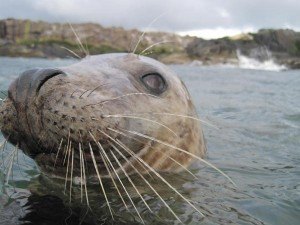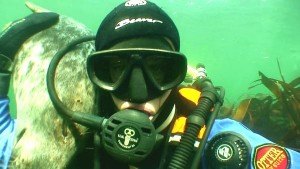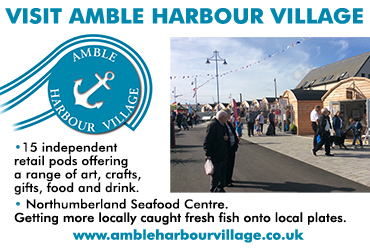Filming seals and dolphins off the NE coast
When he’s not curing the sick people of Amble, doctor Ben Burville will probably be up to twenty miles off the coast, several metres underwater and surrounded by seals or dolphins.
“I grew up in Plymouth, so I was always in the sea. I’ve been diving for 27 years and my wife and I moved to the area in 2002 partly because of the spectacular diving round here, with the Farnes so near.”
Ben has a passion for underwater filming and his videos of grey seals have appeared on primetime TV as well as being used for educational purposes and on his own YouTube channel.
“In the last 12 years, I’ve focussed on filming the grey seals of the north east coast, mainly around the Farnes. I stand by my description of the Farnes as the Galapagos of the North, because the area is so spectacular. In addition to the seals there are so many varieties of birds; auks, kittiwake, shags, gannets, shearwater, petrel, fulmar, and so obviously it’s very popular with birdwatchers. But also there’s an opportunity to see whales and dolphins – recently on 9th November there was a pod of 30 bottle nosed dolphins spotted. At the right time of year you also have a good chance of seeing minke whale and white beaked dolphin. Some species are new to the area – in 2009 we had a humpback whale, the Farnes are a magnet for wildlife.”
Ben says his pastime is mostly centred around grey seals and dolphins . He films grey seals in order to study their underwater behaviour, which he hopes will help with education and conservation. He’s in discussion with Marine Biologists at the School of Marine Science & Technology at Newcastle University, and will be working in collaboration with them on both grey seals and white beaked dolphins in 2013.

For more information on Ben’s work go to www.northseapelagics.co.uk
Additionally, he has begun to study the thousands of white beaked dolphins who swim just off the NE coast. “Very little is known about them, particularly about their pods. There are usually five to six animals, but we know very little about the structure of the pods and also what they do in the winter months. There are sites about 20 miles off Amble where they’re seen in July and August, but we don’t know much about their whereabouts in the winter.”
Getting to where the animals are isn’t always easy and requires a fast boat to reach the sighting areas in a reasonable time. Some of the trips can cover well over 60 miles. Ben has teamed up with boat operator William Shiel who utilises a MCA licenced, RhIB (Rigid hull Inflatable Boat) for these survey trips. Ben has a MMO licence to film the white beaked dolphins using free diving and snorkelling. Passengers on the boat trips have a great opportunity to observe dolphins, whales and a range of pelagic birds. “They were saying ‘We can’t believe you can go out of Seahouses and see minke whales, we’re 45 mins from Seahouses and we’re seeing dolphins!”
“I’m very passionate about this. I did a degree in Marine Biology before I became a GP and at that time I didn’t know you could see white beaked dolphins off the NE coast. I want to help raise public awareness and highlight through my footage that there is this wonderful marine life just off our shores.
Ben is also keen on the establishment of MCZs – Marine Conservation Zones, several of which are proposed around our area. “I’m concerned that there are not as many fish as there were. There is a decline in a number of fish stocks including cod, not because of seals and dolphins, and not because of local fishermen who fish out of Amble or Seahouses. There has for many years been large scale overfishing with factory trawlers taking vast quantities of fish out of the North Sea. It’s unintelligent fishing. For example sand eels, near the bottom of the food-chain, are taken in huge commercial quantities and end up in animal feed, fish oil supplements, margarine and have even been used as fuel. I would like to see the proposed network of 127 recommended MCZs established, in co-operation with local fishermen.
Ben hopes his footage will also help to identify individual white beaked dolphins. It is the first time anyone has ever filmed them underwater in British seas and even the BBC Natural History Unit do not have underwater footage of these dolphin filmed off the UK.
“They are hard to film; they can move very quickly and I’m filming in open, deep sea so it’s a challenge to get the camera focus perfect. You can see they have distinctive markings, so there is the potential for individual identification, including confirmation of the sex of individuals, so we can get an idea of the pod structure. It’s quite exciting and it’s footage I’m proud of.
Ben clearly enjoys balancing his time spent recording and appreciating the natural world with his hectic life as a GP.
“I find that time with nature – especially underwater in the North Sea, provides a greatly valued contrast to the stress and pressures of modern general practice. Medicine is a vocational career that I am very fortunate to enjoy.”
Anna Williams
If you’d like more information on Ben’s work filming the North Sea seals and dolphins, and how you can see them too, visit: www.northseapelagics.co.uk These are expeditionary trips, which lend themselves to those wanting to photograph dolphin & pelagic birds/ occasional minke whales etc from the boat and those with a keen interest in wildlife who simply wish to observe these creatures firsthand. Photos obtained on the boat may be useful for identifying whales/dolphin seen. What to expect on a trip,












